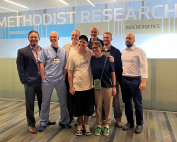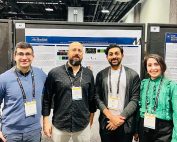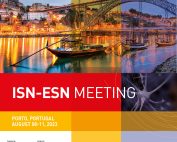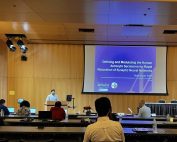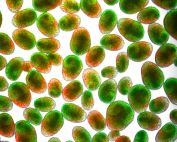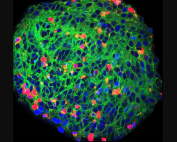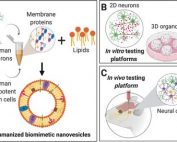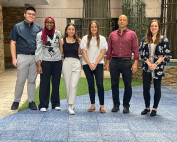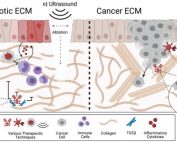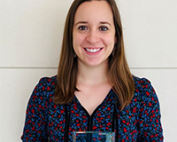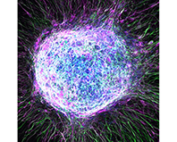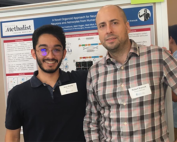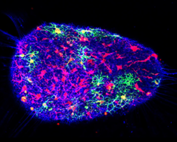Research Feature: Youtube: HOLIDAY SPECTACULAR BENEFITTING WINGS FOR LIFE!
The Krencik Lab was featured in a Holiday Spectacular livestream hosted by YouTuber Grand POOBear benefitting Wings for Life. Watch the recorded interview here (research feature at 2hr 37min).
Research Publication: “Biofabrication of Neural Organoids: An Experiential Learning Approach for Instructional Laboratories” – Biomedical Engineering Education
A Krencik lab research paper, "Biofabrication of Neural Organoids: An Experiential Learning Approach for Instructional Laboratories," was published in Biomedical Engineering Education. Read the paper here and described here.
Presentation: Society for Neuroscience Meeting
November 11-15, 2023 The Krencik lab conducted multiple presentations at the Society for Neuroscience Annual Meeting at Washington, DC.
Presentation: American Neurological Association
Dr. Tahanis received a travel award and presented at the 2023 Annual Meeting of the American Neurological Association in Philadelphia, PA
Presentation: International Society for Neurochemistry
Dr. Krencik presented at the 2023 Meeting of the International Society for Neurochemistry in Porto, Portugal
Award: 2023 Summer Science Symposium
Megh Patel’s podium presentation for trainees was awarded 1st place at the Houston Methodist Association for Postdoctoral and Trainee Affairs (MAPTA) Summer Science Symposium.
In the News: “Evolution of uniquely human DNA was a balancing act, study concludes”
EurekaAlert! highlighted research from the Krencik lab that was published in Neuron. Read more
Award: 2022 Mission Connect Symposium
Megh Patel’s poster presentation was awarded 2nd place at the 2022 Mission Connect Symposium.
In the News: “Human miniature brain models may boost drug screening for neurological diseases” | EurekAlert!
Dr. Krencik and his team have designed neural organoids, also known as “miniature brains,” to contain both mature neurons and astrocytic glial cells in relative proportions similar to that in the human brain. Read more.
Research featured in Advanced Science News
Research from the Krencik lab was featured in Advanced Science News – This Month in Pictures: https://www.advancedsciencenews.com/this-month-in-pictures-7/
Award: Mission Connect Annual Symposium
Samira Aghlara-Fotovat, a Rice University Department of Bioengineering graduate student in the Krencik laboratory, received a 1st place award at the 2021 Mission Connect Annual Symposium for her research poster presentation.
Research Publication: “Humanized Biomimetic Nanovesicles for Neuron Targeting” – Advanced Science
A Krencik lab research paper, “Humanized Biomimetic Nanovesicles for Neuron Targeting” was published in Advanced Science in collaboration with the Taraballi lab at Houston Methodist. It describes a novel theranostic tool for the nervous system. [...]
Summer 2021 Internship Program
During the summer of 2021, the Krencik Lab hosted two summer interns, Alan Ta (pictured at far left) and Ayisat Adegbindin (pictured second from left). Alan is a rising sophomore at Texas A&M University, where [...]
Paper Review: “Targeting the extracellular matrix for immunomodulation” | DDTR
A Krencik Lab review paper, “Targeting the extracellular matrix for immunomodulation: applications in drug delivery and cell therapies,” was published in Drug Delivery and Translational Research. Samira Aghlara-Fotovat, a bioengineering PhD student at Rice University, [...]
Award: Excellence in Mentoring Award
Dr. Caroline Cvetkovic received the Excellence in Mentoring Award sponsored by Houston Methodist’s Office of Graduate Studies and Trainee Affairs during National Postdoctoral Fellow Appreciation Week, September 2020. The Award honors a postdoctoral fellow for [...]
Award: Cancer Prevention and Research Institute of Texas (CPRIT)
The Krencik lab has been awarded a High Impact/High Risk Award for the project “A Novel Organoid Platform to Modulate Human Neural Networks Integrated with Glioblastoma Stem Cells” Read more
Image featured online in Cell
A 3D microscopy image captured by our postdoctoral fellow, Dr. Caroline Cvetkovic, was featured online in Cell. See more
Award: NeuroArt Image Contest
Dr. Caroline Cvetkovic received the Juror’s Choice Winner and People’s Choice Winner awards for her image in the March 2020 NeuroArt Image Contest. See image here
In the News: “Using Mini Brains to Maximize Research” | TMC Pulse
When neuroscientist Robert Krencik figured out how to fast-track the growth of mini-brains, he shared his process with the scientific community. Over the past two years, his method has been adopted in labs around the [...]
Award: Rice University Undergraduate Research Symposium
Undergraduate volunteer Arya Shetty won an Outstanding Poster award at the Rice University IBB Summer Undergraduate Research Symposium in August 2019
Award: 2019 BMES Career Development Award
Caroline Cvetkovic, PhD, was awarded a 2019 BMES Career Development Award to attend the Biomedical Engineering Society annual meeting in Philadelphia, PA. https://www.bmes.org/
Presentation: | Kaist Glia Laboratory
Robert Krencik, PhD, presented at the Korean Advanced Institute of Science and Technology (KAIST) hosted by the lab of Won-Suk Chung, PhD. https://www.kaistglia.org/
Paper Review: Stem Cells & Tissue Engineering in Development, Disease & Repair | Developmental Dynamics
A Krencik Lab review paper was featured on the Developmental Dynamics cover for the special issue “Stem Cells & Tissue Engineering in Development, Disease & Repair” https://pbs.twimg.com/media/DwU15k3WwAEKg2y.jpg:large
Presentation: Miniature Brain Machinery Program | University of Illinois Urbana-Champaign
The next frontier for studying brain development and function lies in rationally deciphering, harnessing, and engineering the living 3D brain. Read more.
Featured on television: Houston lab grows miniature brains to invent ways to heal brain injuries, diseases | Click2Houston
Inside a research lab at Houston Methodist, they're growing hundreds of miniature brains from stem cells. Watch video.
In the news: “Using Astrocytes to Speed Organoid Development” | BioTechniques
Organoid models, or three-dimensional mini-brains, allow scientists a novel way to study brain disease as well as test potential treatments ... Read more.
In the news: “3-D mini brains accelerate research for repairing brain function” | EurekAlert!
The Houston Methodist Research Institute is making mini brains from human stem cells that put researchers on a fast track to repair the nervous system ... Read more.
In the news: “New Genetic Models of Autism Point to Cellular Roots of Disease | UCSF
Researchers at UC San Francisco have developed a new genetic model of autism, using neurons created in the lab from patients’ own skin cells. Read more.
In the news: “Brain cell advance brings fresh hope for Creutzfeldt-Jakob disease therapies” | ScienceDaily
Experts have developed a way of studying the disease in the lab using brain cells derived from human stem cells. Read more.
In the news: “Protein webs tangle up neurons in autism-linked disorder” | Spectrum
Star-shaped brain cells called astrocytes weave a web of proteins that upsets brain development in the autism-like Costello syndrome. Read more.
Research featured news: “RASopathic” astrocytes constrain neural plasticity | ScienceMag.org
Over the past decade, mutations in genes encoding RAS family members, other components of an intracellular signaling cascade that RAS controls, and proteins that modify the cascade have been recognized ... Read more.
In the news: Astrocytes lock down neurons in RASopathies | Bioworld
Researchers have found that the neurodevelopmental disorder Costello syndrome may be due to deregulated signaling to neurons by a supporting cell type, the astrocyte. Read more.
In the news: “Growing Astrocytes” | JAMA Network
A team led by researchers at the University of Wisconsin, in Madison, has directed human embryonic and induced pluripotent stem cells to become immature astrocytes in the laboratory (Krencik R et al. Nat [...]
In the news: “Stem Cell Recipe for Astrocytes” | ALZFORUM
Researchers at the University of Wisconsin-Madison have cooked up a method to nudge pluripotent stem cells all the way to astrocytes. The new protocol, published online May 22 in Nature Biotechnology, means researchers can better [...]
